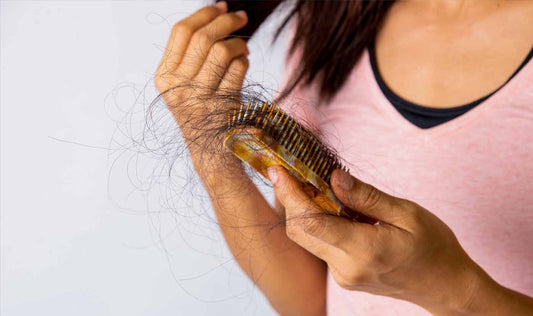Hair loss can be caused by a variety of factors, including diseases, nutritional deficiencies, inadequate food intake, stress, chemotherapy, and autoimmune conditions.
Scientific evidence has shed light on these causes, providing valuable insights into understanding and addressing hair loss.
Before we dive in to more details, check this product that make your hair stronger from the inside out:

Certain diseases and medical conditions can contribute to hair loss. For example:
- Alopecia areata is an autoimmune condition where the immune system mistakenly attacks the hair follicles, leading to sudden and often patchy hair loss. It is believed to result from a combination of genetic and environmental factors. In some cases, complete loss of scalp hair (alopecia totalis) or total body hair loss (alopecia universalis) can occur. Although the exact cause is unknown, it is thought to involve an immune system malfunction that disrupts the hair growth cycle.
- Androgenetic alopecia, commonly known as male or female pattern baldness, is the most common form of hair loss. It is influenced by genetic factors and hormonal imbalances. In men, the hair loss typically begins with a receding hairline and thinning at the crown, while in women, it often presents as overall thinning of the hair. Androgenetic alopecia is influenced by the hormone dihydrotestosterone (DHT), which causes miniaturization of hair follicles and shortens the growth phase of the hair.
- Telogen effluvium is a form of temporary hair loss characterized by an increased shedding of hair. It can be triggered by various factors, including physical or emotional stress, hormonal changes, nutritional deficiencies, major surgery, or certain medications. This condition disrupts the hair growth cycle, causing a larger number of hair follicles to enter the resting (telogen) phase simultaneously, leading to increased hair shedding.
- Thyroid disorders: Imbalances in thyroid hormones can disrupt the hair growth cycle, leading to hair thinning or loss. Thyroid Disorders: Hypothyroidism (underactive thyroid) and hyperthyroidism (overactive thyroid) can both contribute to hair loss. Thyroid hormones play a crucial role in regulating hair growth and follicle function. In hypothyroidism, the reduced levels of thyroid hormones can lead to hair thinning and slow hair growth. Conversely, hyperthyroidism can accelerate the hair growth cycle, resulting in increased shedding and brittle hair.
- Scalp infections: Fungal or bacterial infections of the scalp, such as tinea capitis (ringworm), folliculitis, or cellulitis, can cause inflammation and damage to the hair follicles. This can lead to localized or diffuse hair loss, depending on the severity and extent of the infection.
- Trichotillomania: A psychological disorder characterized by compulsive hair pulling, which can result in noticeable hair loss.
- Chemotherapy: Chemotherapy drugs are powerful medications used in cancer treatment to kill rapidly dividing cells, including cancer cells. Unfortunately, they also affect other rapidly dividing cells in the body, including hair follicles. As a result, chemotherapy-induced hair loss, known as chemotherapy-induced alopecia, is a common side effect. Hair loss can occur on the scalp, eyebrows, eyelashes, and other body areas. The extent and regrowth of hair after chemotherapy vary depending on the specific drugs used and individual factors.
- Emotional Stress: Experiencing high levels of emotional or psychological stress can lead to a condition known as telogen effluvium, which causes increased shedding of hair. Stress can disrupt the normal hair growth cycle, pushing many hair follicles into the resting (telogen) phase prematurely. This results in excessive hair shedding several months after the stressful event or period. While the exact mechanisms are not fully understood, it is believed that stress hormones and changes in immune function play a role in triggering telogen effluvium.
- Hormonal Changes: Hormonal fluctuations can influence hair growth and contribute to hair loss. Some specific hormonal causes include:
- Pregnancy and childbirth: Hormonal changes during pregnancy can prolong the growth phase of the hair, resulting in thicker, fuller hair. However, after childbirth, a sudden drop in hormone levels can trigger excessive shedding, known as postpartum hair loss.
- Menopause: Hormonal changes during menopause, specifically a decrease in estrogen levels, can lead to hair thinning and loss in some women.
- Nutritional deficiencies:
Inadequate intake of certain vitamins and minerals can impact hair health and contribute to hair loss. Scientific research has highlighted the following deficiencies:
- Vitamin and mineral deficiencies: Deficiencies in vitamins A, D, E, and various B vitamins, as well as minerals like zinc and selenium, can impact hair health and contribute to hair loss. B vitamin deficiencies: Biotin, niacin, and other B vitamins play essential roles in hair growth and deficiency in these nutrients can contribute to hair loss. Vitamin D deficiency: Studies suggest that low vitamin D levels may be associated with hair loss, although the exact mechanisms are not fully understood.
- Iron deficiency: Iron is crucial for healthy hair growth, and insufficient iron levels can lead to hair thinning and increased shedding.
- Inadequate food intake:
Poor nutrition, crash diets, or restrictive eating patterns can deprive the body of essential nutrients, affecting hair health. Insufficient protein, vitamins, and minerals necessary for hair growth can lead to weakened hair follicles and increased hair shedding. Protein deficiency: Hair is primarily composed of protein, so inadequate protein intake can weaken hair follicles and lead to hair loss.
- Autoimmune conditions:
Certain autoimmune disorders can target hair follicles, leading to hair loss. Alongside alopecia areata, other autoimmune conditions that may contribute to hair loss include systemic lupus erythematosus (SLE) and lichen planopilaris. These conditions involve an immune system attack on hair follicles, resulting in varying degrees of hair loss.
Diagnosing the specific causes of hair loss often requires a comprehensive evaluation that may involve various diagnostic methods. Here are some common approaches used by healthcare professionals:
- Medical History and Physical Examination:
A detailed medical history, including questions about family history of hair loss, recent illnesses, medication use, and lifestyle factors, can provide valuable insights. A physical examination of the scalp and hair can help identify any visible signs or patterns of hair loss.
- Blood tests can assess specific factors related to hair loss, such as:
- Complete blood count (CBC): Determines if anemia or other blood abnormalities are present.
- Thyroid function tests: Evaluates thyroid hormone levels, as imbalances can contribute to hair loss.
- Hormone levels: Tests for androgen levels (e.g., testosterone) to rule out hormonal causes.
- Vitamin and mineral levels: Measures levels of nutrients like iron, vitamin D, and B vitamins to identify deficiencies.
- Scalp Biopsy: In certain cases, a scalp biopsy may be recommended to examine a small sample of the scalp tissue. This procedure can help identify specific scalp conditions or autoimmune disorders affecting hair follicles.
- Trichoscopy involves using a special handheld device to examine the scalp and hair follicles in detail. It can help identify specific hair and scalp conditions, such as miniaturization of hair follicles or characteristic patterns associated with different types of hair loss.
- Dermoscopy is a non-invasive technique that uses a handheld device with magnification and light to examine the scalp and hair follicles. It can assist in identifying specific features and patterns associated with different hair and scalp conditions.
It is important to note that diagnosing the specific cause of hair loss requires medical evaluation and consultation with a healthcare professional.
They can assess your medical history, perform appropriate tests, and provide an accurate diagnosis to guide treatment options specific to your condition.















